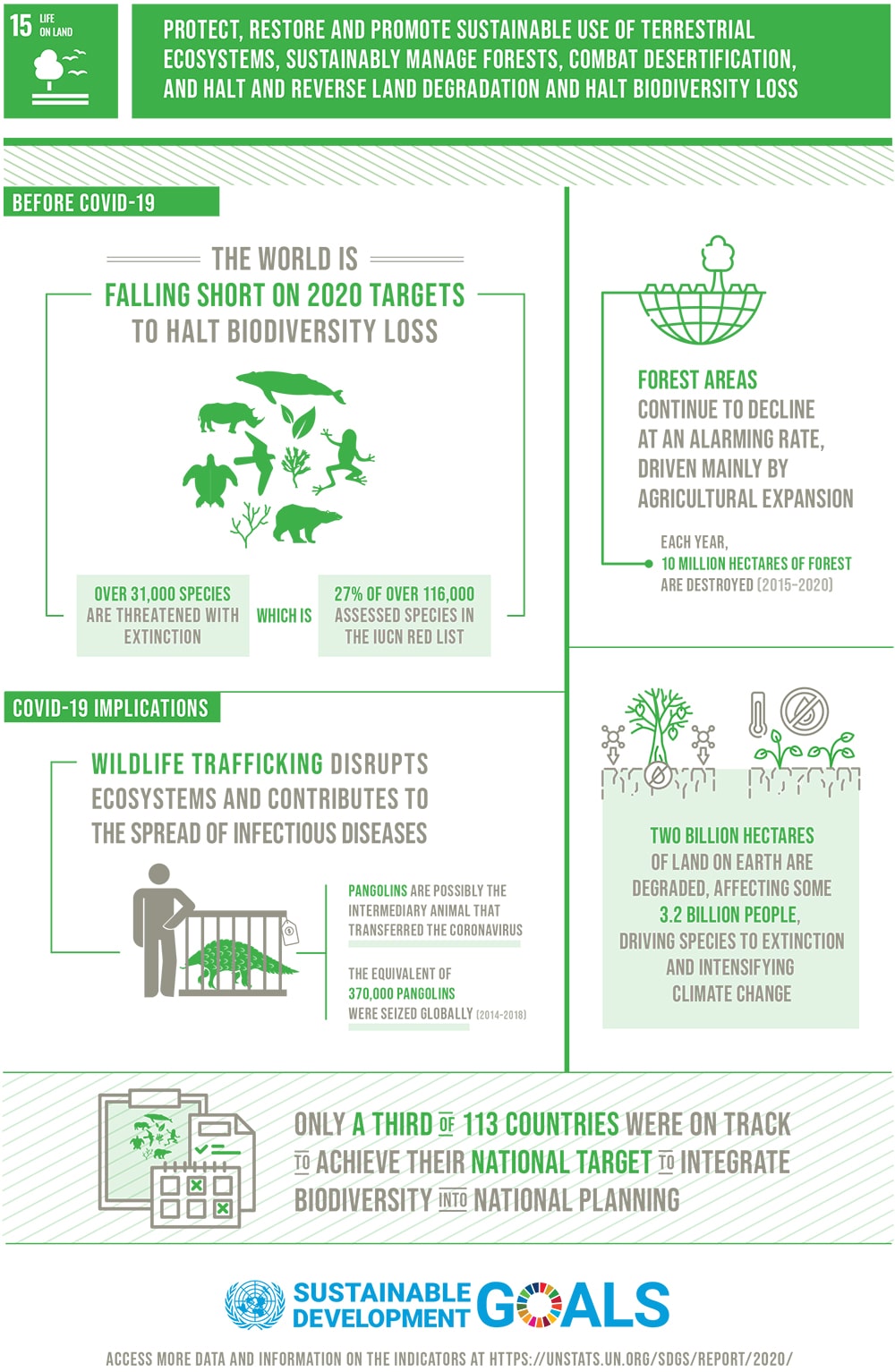Why is this important
Forests, like water, are major sources of existence for humans. From providing oxygen, food, raw material, fuel to herbs, medicinal compositions, protection against drastic climatic patterns; forests are an essential resource for civilization. As per the Sustainable Development Goals Report-2020, forests are also home for 80% of the world’s plants and animal species, and filter the carbon dioxide to produce oxygen. And the UNDP estimates that 80% of the human diet is derived from plants, thus making civilization heavily dependent on agriculture, which in turn required fertile land derived from forests.
Forest loss is a major environmental issue that contributes significantly to the severity of climate change. It refers to the loss of green cover through the process of deforestation which misplaces the natural habitats of various plant and animal species. This leads to loss of livelihood for the rural population, land degradation, displaced biodiversity and increased carbon emissions.
Displaced biodiversity leads to the decrease in chance for survival for certain plant and animal species, which can worsen to the state of irreversible damage in case a species goes extinct. According to the Intergovernmental Science-Policy Platform on Biodiversity and Ecosystem Services (IPBES) in their global assessment report-2019, around one million plant and animal species face the threat of extinction. Extinction is irreversible and causes an indefinite shift or disturbance in the ecosystem, which further endangers the other living organisms, including humans.
Along with deforestation, desertification also poses a major challenge which leaves the land to become unusable, thus depleting the economic value it usually has or potentially could have. It also displaces any tribal communities living harmoniously within the forests thus destroying their home and work.

Understanding the root cause for Forest loss
Loss of forest cover comes from excess anthropogenic activities which exploit natural resources beyond their point of renewal. Without appropriate time given between creation and regeneration, the balance tips off and leads to a disturbed ecosystem. That is, there is the occurence of deforestation at a rate so rapid it leads to desertification, which nullifies the land for any further productive use.
This particular exploitation, as per the Sustainable Development Goals Report-2020 also comes from demand for animal protein, overuse of wildlife and unsustainable farming. And loss of biodiversity takes away from other areas of livelihood and additionally affects the vulnerable in a much worse manner. Without forest cover, any means of mitigating climate change become less efficient.
Additionally there is an onslaught of zoonotic diseases such as Covid 19, that is, diseases transmitted through animals increase due to the animals lacking their usual healthy ecosystem, which helps not only reduce the infection but also contains any possible spread of the disease. These especially affect the rural population gravely, specifically those whose livelihood leads them to live in close relation to forests.
Additionally forests, which prevent overflowing of rivers, floods, landslides and droughts, as well as restore groundwater tables, fertility etc are major areas of interest in climate mitigation. Biodiversity also assists in supporting global water and food security.
Changemakers fighting poverty
Deforestation is one of the most palpable issues, especially due to the consequent extinction and endangerment of plant and animal species. This has caused a movement of action to preserve our flora and fauna along with our major areas of green cover. International Union for Conservation of Nation (IUCN) is an organization that utilises means of data gathering and analysis through research to lead advocacy projects for the conservation of forests and practice of sustainable management of forests. United Nation Forum on Forests is a policy forum that runs across governments of member states along with major groups and organizations. Rainforest Alliance is a nonprofit that operates across 70 countries that aims to create an intersection between businesses, agriculture and communities to promote sustainable business while protecting rainforests and improving livelihoods of forest communities. Global Forest Coalition is a coalition between indigenuous forest communities and conservation NGOs, that works towards protecting the interest of forest communities while forming sustainable and responsible forest-community centric policies.
What youth can do as a TAL transformer
It is upon us to preserve living organisms and biodiversity that we share the planet with. Not only to balance the ecosystem but also to ensure our own survival. We also need to have compassion for our fellow beings which have the same, if not greater, right to the natural resources that humans plunder carelessly.
What you as a transformer for the society can do, is use social advocacy, philanthropy and entrepreneurial/business ideas in an innovative manner to provide a progressive direction for reaching the goal. Instances of which are as follows:
Social Advocacy
- Promote recycling and ethically run forest reserves
- Promote ecotourism to connect closely with nature and respect biodiversity
- Promote biodiversity growth and safe management of green cover in immediate vicinity
Social Philanthropy
- Create a fund for supporting endangered species
- Financially support tribal and rural communities to enable local safeguarding of forest areas
- Invest in safeguarding local forest ecosystems
Social Entrepreneurship
- Promote mechanisms to combat desertification and land degradation
- Implement sustainable practices of agriculture and utilise sustainably sourced goods for a degradation-neutral ecosystem
- Promote sustainable management of forests and local inland ecosystems.
References
United Nations (2020). The Sustainable Development Goals Report 2020. New York: United Nations, Department of Economic and Social Affairs. Retrieved from https://unstats.un.org/sdgs/report/2020/
https://www.undp.org/sustainable-development-goals#life-on-land
Sustainability Program Manager
